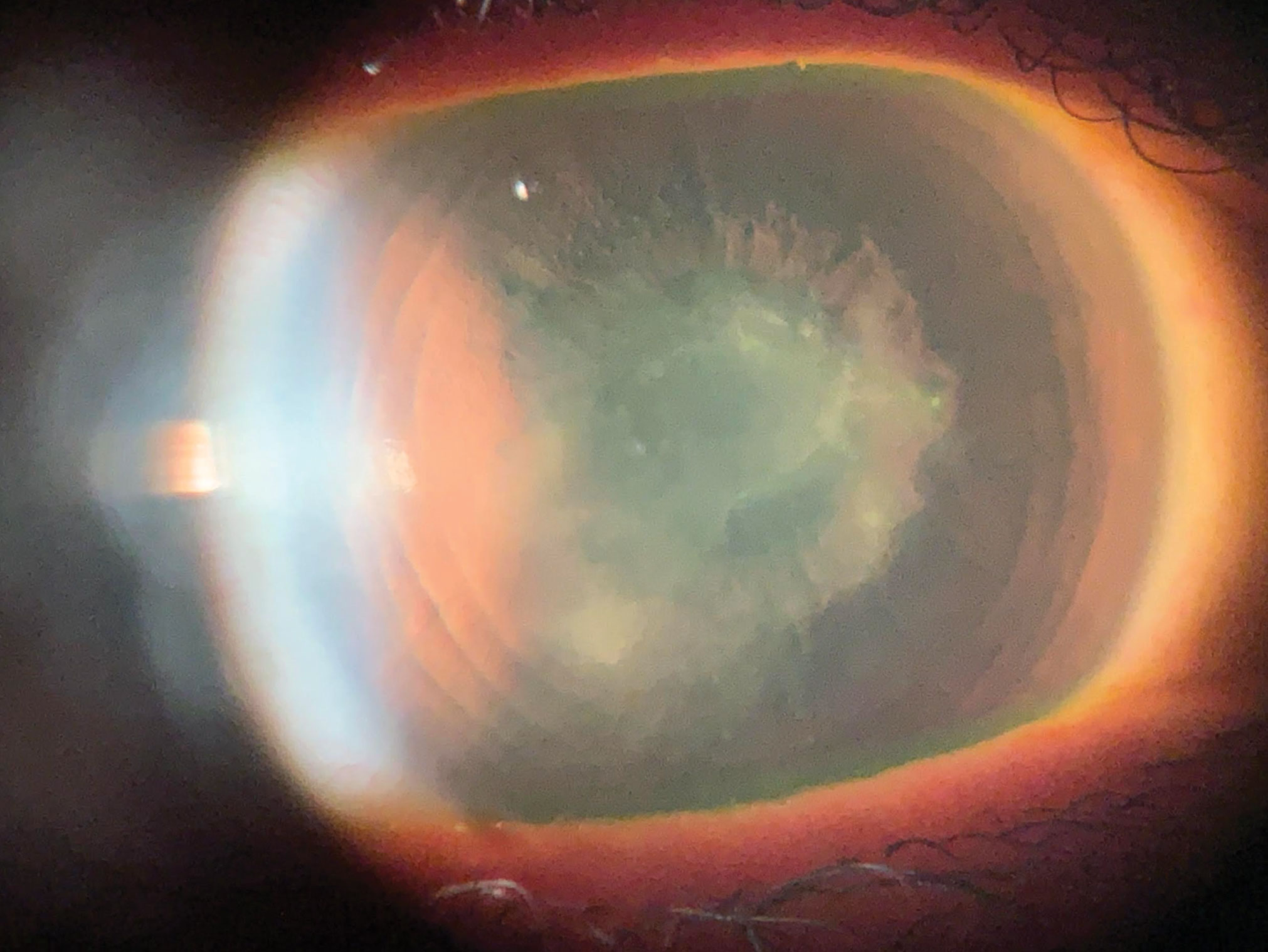 |
Q:
I have a patient who requires oral antiviral prophylaxis for recurrent herpes simplex viral keratitis (HSVK). Are there any significant risks for viral resistance with chronic use like we experience with prolonged use of antibiotics?
HSVK is a fairly common corneal complication, says Cecelia Koetting, OD, who practices in Denver. The rate of incidence within the United States is estimated at 8.4 new cases per 100,000 and 20.7 total episodes per 100,000 each year.1 In patients affected by recurrent HSVK, Dr. Koetting notes there is concern for possible resultant scarring and loss of vision or other permanent damage to the eye such as reduced corneal sensation. There is an increased risk with each occurrence of HSVK. Reoccurrence after the initial episode has been estimated to be 10% at one year, 23% at two, 36% at five and >60% at 20 years.1 Oftentimes, these patients require antiviral prophylaxis to help decrease the risk, says Dr. Koetting.
 |
| A corneal scar from HSVK with a persistent epithelial defect after a corneal erosion. Click image to enlarge. |
Thoughts
The HEDS study found the reoccurrence rate of HSVK to be 34% after a single episode in the 346 included patients.2 Use of prophylactic acyclovir 400mg PO QD was shown in the same study to decrease the incidence of HSVK reoccurrence by 45% over an 18-month treatment period.2 Another study found that one-year HSVK suppression therapy with oral valaciclovir 500mg PO QD was as effective as acyclovir 400mg PO BID in reducing HSVK disease reoccurrence, but that any benefit ceased when the antiviral was stopped.3
There is some concern that affected patients may develop resistance to these prophylactic antivirals, notes Dr. Koetting. Several case reports and studies have documented resistance to acyclovir and other antivirals and discussed potential mechanisms of action. HSVK is a DNA virus, and replication of the virus requires the protein thymidine kinase (TK).4-6 This is the target of antiviral drugs acyclovir, valaciclovir and famciclovir that are commonly used as treatment. The theory is that resistance results from mutations that affect the production or specificity of TK.4-6
When suspected or previously known drug resistance exists in HSVK patients, switch to another antiviral. Resistance rates with acyclovir are approximately 0.1% to 0.98% in immunocompetent patients and approximately 3.92% to 14.3% in immunosuppressed patients.8 Alternative antivirals, such as foscarnet and cidofovir, are available and have the same mechanism of action involving TK but prevent viral DNA synthesis by inhibiting DNA polymerase.6-8 Studies have also indicated that approximately 5% of patients who are acyclovir-resistant are also resistant to other antivirals, including foscarnet and cidofovir.7
Clinical Takeaways
There is always the possibility that patients on prophylactic antivirals eventually develop resistance. This does not mean we should stop administering this treatment for HSVK, but it does mean that we must monitor affected patients even more closely to make sure the prescribed therapy is having the intended effect and not causing adverse events such as renal failure. The same goes for patients with persistent HSVK that is responding poorly to standard therapy.
Dr. Shovlin, a senior optometrist at Northeastern Eye Institute in Scranton, PA, is a fellow and past president of the American Academy of Optometry and a clinical editor of Review of Optometry and Review of Cornea & Contact Lenses. He consults for Kala, Aerie, AbbVie, Novartis, Hubble and Bausch + Lomb and is on the medical advisory panel for Lentechs.1. Young RC, Hodge DO, Liesegang TJ, Baratz KH. The incidence, recurrence and outcomes of herpes simplex virus eye disease in Olmsted County, Minnesota, 1976 through 2007: the impact of oral antiviral prophylaxis. Arch Ophthalmol. 2010;128(9):1178-83. 2. Herpetic Eye Disease Study Group. Acyclovir for the prevention of recurrent herpes simplex virus eye disease. N Engl J Med. 1998;339(5):300-6. 3. Miserocchi E, Modorati G, Galli L, Rama P. Efficacy of valacyclovir vs acyclovir for the prevention of recurrent herpes simplex virus eye disease: a pilot study. Am J Ophthalmol. 2007;144(4):547-51. 4. Piret J, Boivin G. Antiviral resistance in herpes simplex virus and varicella-zoster virus infections: diagnosis and management. Curr Opin Infect Dis. 2016;29(6):654-62. 5. Pan D, Kaye SB, Hopkins M, et al. Common and new acyclovir resistant herpes simplex virus-1 mutants causing bilateral recurrent herpetic keratitis in an immunocompetent patient. J Infect Dis. 2014;209(3):345-9. 6. Choong K, Walker NJ, Apel AJ, Whitby M. Aciclovir-resistant herpes keratitis. Clin Exp Ophthalmol. 2010;38(3):309-13. 7. Gilbert C, Bestman-Smith J, Boivin G. Resistance of herpesviruses to antiviral drugs: clinical impacts and molecular mechanisms. Drug Resist Updat. 2002;5(2):88-114. |

